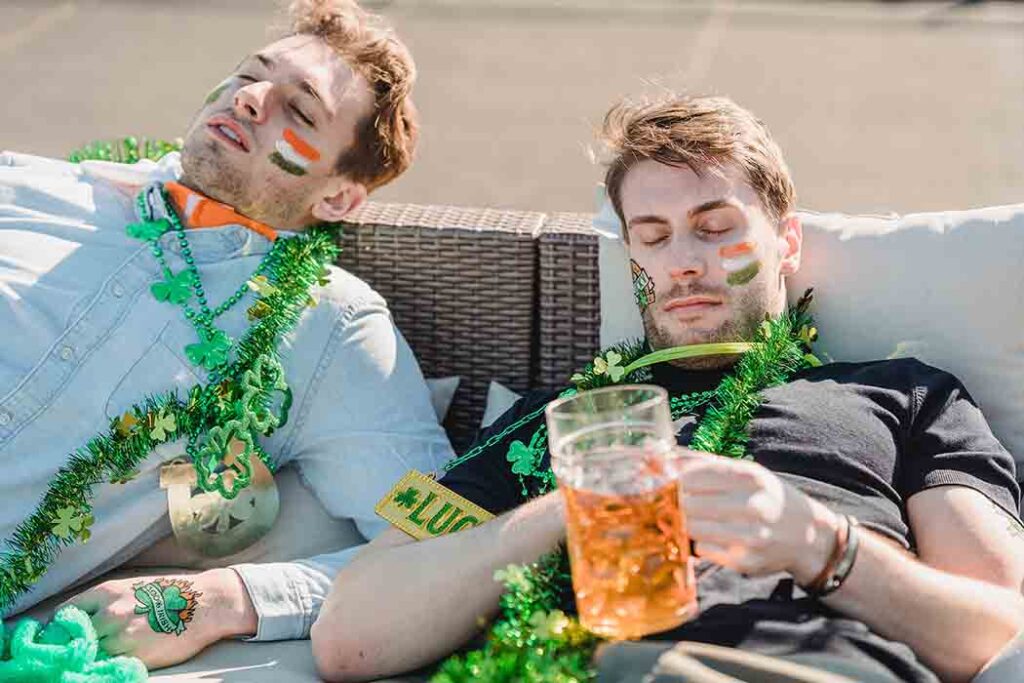What is a holiday hangover?
A “holiday hangover” isn’t quite the same as the familiar after-effects of overindulging in alcohol during the festive season. It’s a broader term used to describe a range of physical, emotional, and mental fatigue that can follow the holiday period. Here are some key elements of a holiday hangover:
Physical Exhaustion:
- Overexertion: Holiday travel, decorating, cooking, and celebrations can leave you physically drained.
- Disrupted sleep: Late nights, early mornings, and changes in routine can throw off your sleep schedule, contributing to fatigue.
- Unhealthy eating: Party foods and indulgent treats can lead to digestive issues and contribute to sluggishness.
Emotional and Mental Drain:
- Social pressures: Meeting family expectations, navigating complicated dynamics, and maintaining a cheerful facade can be emotionally taxing.
- Financial strain: Gift-giving, travel expenses, and holiday décor can put a financial burden that can linger and cause stress.
- Post-holiday blues: The excitement and anticipation of the holidays can lead to a letdown when it’s all over, leaving you feeling flat and unmotivated.
Table of Contents
Holiday Hangover Symptoms

The festive season might be over, but its aftereffects can linger in the form of a dreaded holiday hangover. It’s not just about throbbing temples and fuzzy memories (though those can be part of it!). Think of it as a mental and physical fatigue that steals your post-holiday sparkle. Here’s a peek at the common symptoms:
Feeling Like a Deflated Balloon:
- Exhaustion: All that merriment takes a toll. Late nights, early mornings, and a whirlwind of activity can leave you feeling like a squeezed-out sponge.
- Sleep Debts: Your internal clock might be in disarray after holiday disruptions. Say goodbye to predictable slumber and hello to the land of fragmented sleep and grogginess.
- Achy-Breaky Body: You may feel like your body participated in an impromptu decathlon. From hauling decorations to dancing late into the night, aches and pains can become unwelcome souvenirs.
Emotional Rollercoaster:
- The Blues Have Arrived: The holiday high fades, leaving a space for feelings of disappointment, sadness, or even a touch of loneliness. It’s okay, even Santa needs a break from the cheer sometimes.
- Financial Fidgets: Let’s face it, holiday gifts and festivities can put a strain on the wallet. Post-holiday bills can add a dash of stress to the already emotional mix.
- Social Overload Recovery: All that family time, reunions, and parties can be wonderful, but sometimes they leave you needing some solo recharge time to avoid feeling overwhelmed.
The Fog is Rolling In:
- Brain Drain: Focus and concentration might take a holiday of their own. Difficulty getting things done and feeling mentally fuzzy are common symptoms of the post-festive slump.
- Motivation MIA: Remember all those ambitious plans you made for the new year? They might be hiding under a pile of wrapping paper right now. Don’t worry, they’ll resurface when your energy returns.
- Creativity on Vacation: Feeling uninspired and lacking those creative sparks? It’s okay, even the most brilliant minds need a time-out to reset and recharge.
Remember, a holiday hangover is temporary. Be kind to yourself, prioritize rest and relaxation, and slowly ease back into your routine. Soon, you’ll be back to your dazzling, pre-hangover self, ready to tackle the new year with newfound energy!
See more : Top 10 Best Christmas Movies to Warm Your Holiday Spirit
Night Owls Beware: Study Links Late Sleep to Increased Artery Calcification
Holiday Hangover Quotes

- “My holiday spirit has officially evaporated, leaving behind a puddle of exhaustion and regret about those five extra helpings of cookies.” – Anonymous
- “My to-do list for today: 1. Recover from the emotional rollercoaster of the holidays. 2. Repeat step 1 until further notice.” – Sarah Cooper
- “Don’t be fooled by the sparkly facade. Underneath this festive sweater lies a hibernating creature fueled by coffee and holiday leftovers.” – Emily Giffin
- “My new year’s resolution is to learn the art of disappearing as gracefully as the Christmas decorations after January 1st.” – Unknown
- “My brain currently operates on the same schedule as a broken Christmas light string: sporadic flashes of brilliance followed by long periods of darkness.” – Jenny Lawson
- “Post-holiday me is less “New Year, New Me” and more “Same Me, Just in Pajamas for the Foreseeable Future.” – Kristen Wiig
- “Holiday hangover symptoms: achy everything, wallet weeping softly, social battery depleted. Please send reinforcements (in the form of pizza and fuzzy blankets).” – Michael Schur
- “The holidays were magical, but now I’m back to reality and it feels like Santa switched my reindeer for slugs.” – Charlie Puth
- “My current mood is the Grinch after Whoville stole Christmas: grumpy, slightly bitter, and in desperate need of a nap.” – Dr. Seuss, probably
- “Let’s raise a glass (of water, obviously) to surviving the holidays! May we all recover gracefully and emerge from our festive cocoons with renewed hope and slightly less glitter in our hair.” – Cheers to all!
How do you recover from a holiday hangover?

A holiday hangover can be a real drag, but fear not, there are ways to bounce back and reclaim your post-festive sparkle! Here are some tips to address the physical, emotional, and mental toll the holidays might have taken:
Physically:
- Rest and recharge: Prioritize sleep! Catch up on those hours you lost during the holiday hustle. Take naps, cuddle up with a good book, and give your body time to recover.
- Nourish your body: Ditch the holiday leftovers and focus on healthy, nutritious meals. Plenty of fruits, vegetables, and whole grains will replenish your energy and boost your mood.
- Hydrate, hydrate, hydrate! Water is your best friend. Dehydration can worsen fatigue and headaches, so keep a glass by your side and keep those fluids flowing.
- Gentle movement: You don’t need to hit the gym right away, but some light exercise can work wonders. A walk in nature, some yoga stretches, or even dancing to your favorite tunes can get your blood flowing and improve your mood.
Emotionally:
- Acknowledge your feelings: It’s okay to feel sad, stressed, or even a little burnt out after the holidays. Don’t bottle up your emotions, talk to someone you trust, or journal about your thoughts and feelings.
- Set realistic expectations: Don’t jump back into your pre-holiday routine headfirst. Allow yourself time to adjust and ease back into your usual rhythm.
- Reconnect with yourself: Take some time for self-care. Do something you enjoy, whether it’s reading, listening to music, spending time in nature, or taking a long bath. Prioritize your own well-being.
- Seek support: If you’re feeling overwhelmed, reach out to friends, family, or a mental health professional. There’s no shame in asking for help, and it can make a big difference in your recovery.
Mentally:
- Break down your to-do list: Feeling overwhelmed by all the tasks you need to tackle? Chunk your list into smaller, manageable steps. Taking it one step at a time will make it less daunting.
- Embrace the simple things: Focus on the little things that bring you joy, like spending time with loved ones, watching a funny movie, or reading a good book. Finding moments of pleasure can help boost your mood and motivation.
- Set attainable goals: Don’t set yourself up for disappointment with unrealistic resolutions. Start with small, achievable goals and build momentum from there. Celebrating your successes, no matter how small, will help you stay on track.
- Practice mindfulness: Activities like meditation, deep breathing, or spending time in nature can help you stay present and reduce stress. Taking a few minutes for yourself each day can make a big difference in your mental clarity and focus.
Remember, recovering from a holiday hangover takes time. Be patient with yourself, listen to your body and mind, and don’t be afraid to ask for help. With a little effort and self-compassion, you’ll be back to your pre-holiday self in no time!
Happy holidays, and happy recovery!
What is the difference between hangover and hungover?
Both “hangover” and “hungover” are grammatically correct and refer to the same thing: the unpleasant physical and emotional aftereffects of consuming too much alcohol. However, there are some subtle differences in usage and style:
Hangover:
- More common: This is the standard, widely accepted spelling used in both formal and informal writing.
- Neutral/descriptive: It simply describes the state of being hungover, without carrying any additional connotations.
- Used in phrases: Often appears in phrases like “to have a hangover,” “suffering from a hangover,” or “curing a hangover.”
Hungover:
- Less common: While grammatically correct, it appears less frequently than “hangover” in most writing and dialogue.
- Informal/conversational: This spelling is more likely to be used in informal speech and writing.
- Emphasis on past tense: While both forms can be used in the past tense, “hungover” sometimes feels slightly more emphatic, possibly because it’s less common and therefore stands out more.
Here’s a quick breakdown:
| Spelling | Commonness | Style | Connotations | Examples |
|---|---|---|---|---|
| Hangover | More common | Formal & informal | Neutral, descriptive | I have a hangover. / She’s suffering from a hangover. |
| Hungover | Less common | Informal | Slightly informal, may emphasize past tense | I woke up hungover. / We were all hungover after the party. |
Ultimately, both “hangover” and “hungover” are acceptable. Choosing one over the other depends on the context and your personal preference.
I hope this clarifies the difference and helps you navigate the tricky world of hangover linguistics!
How long does holiday hangover last?
The duration of a holiday hangover varies depending on several factors, including:
Severity of the “overindulgence”: The more you overdid it with food, drinks, socializing, or travel, the longer it might take to recover. Individual differences: Some people bounce back quickly, while others take longer to re-energize. Age, sleep patterns, overall health, and personal coping mechanisms also play a role. The nature of your “hangover”: Physical exhaustion might disappear faster than emotional fatigue or post-holiday blues.
Here’s a general estimate:
- Physical symptoms: Usually last 1-3 days, with fatigue and aches fading first, followed by digestive issues and headaches.
- Emotional and mental symptoms: Can linger for longer, up to a week or even more, depending on individual factors and how well you address them.
Tips for a shorter hangover:
- Prioritize sleep: Catch up on those lost hours.
- Nourish your body: Eat healthy foods to replenish nutrients.
- Gentle exercise: Get your blood flowing with a walk or light yoga.
- Practice mindfulness: Relaxation techniques like meditation can help manage stress and boost mood.
- Connect with loved ones: Social support can ease emotional burdens.
- Set realistic expectations: Don’t jump back into your pre-holiday routine too quickly.
- Seek help if needed: Don’t hesitate to reach out to a therapist or counselor if you’re struggling with persistent mood issues or post-holiday stress.



